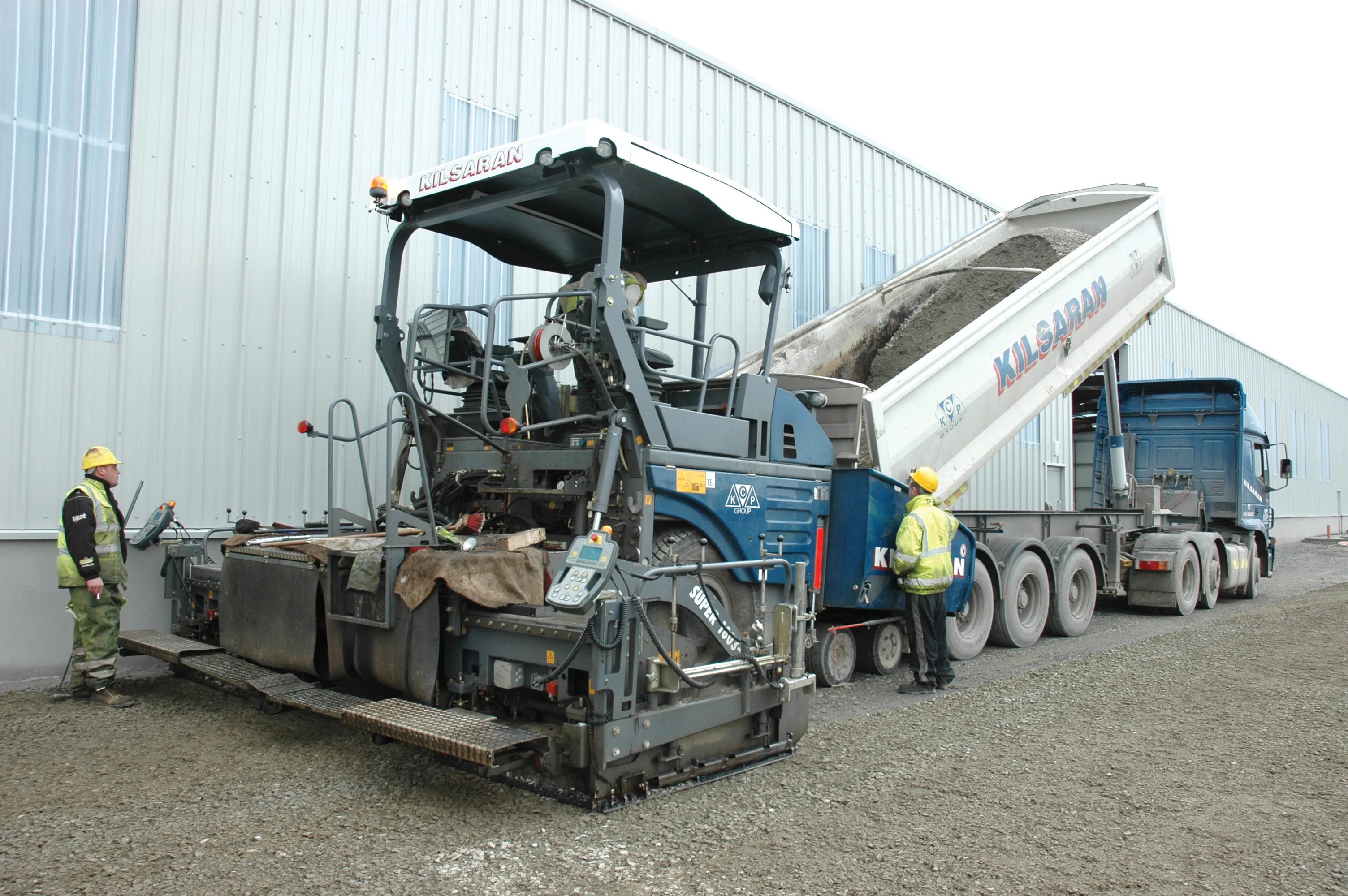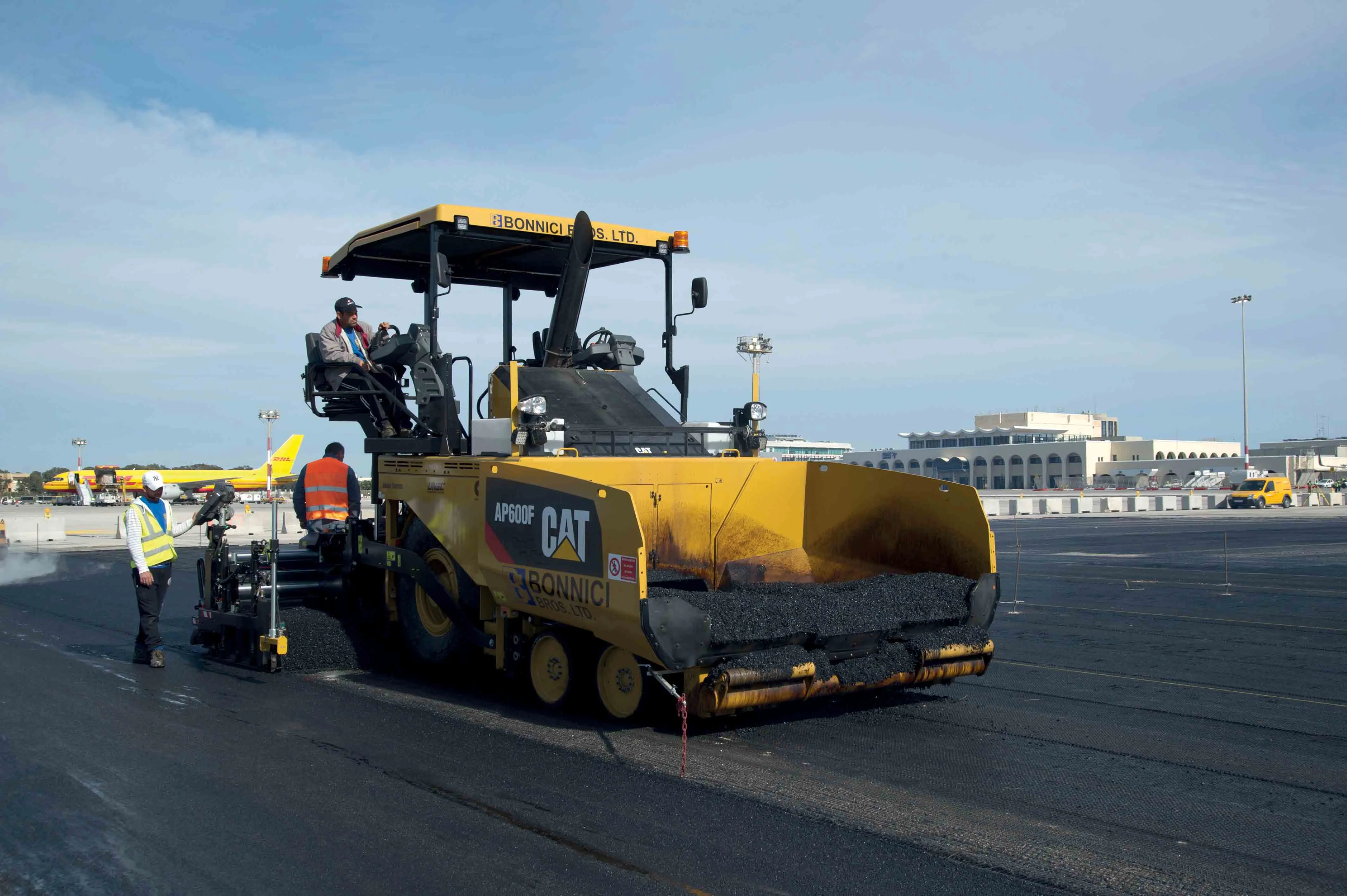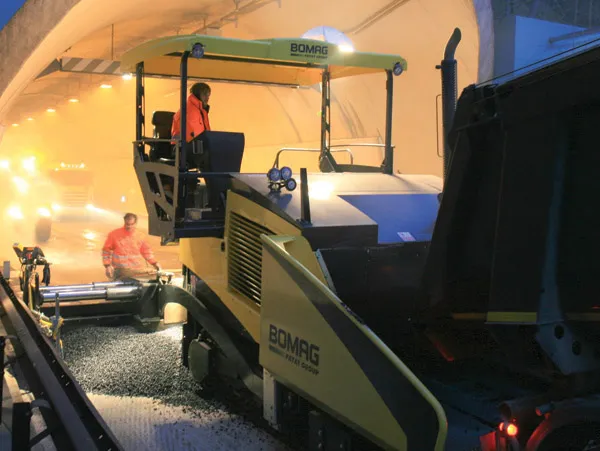Kilsaran, a leading Irish contractor, building materials supplier and producer of concrete products, has completed construction of 11,000m² of hard standing at its first dedicated mortar plant using Vögele's most powerful wheeled paver. The plant in Brownstown, County Kildare, will produce a variety of mortars, including bagged products, for distribution throughout Ireland. The Vögele 1803-2 is one of four such machines operated by the company, and it complements a range of plant, including Hamm compaction
July 31, 2012
Read time: 3 mins

Kilsaran, a leading Irish contractor, building materials supplier and producer of concrete products, has completed construction of 11,000m² of hard standing at its first dedicated mortar plant using 1194 Vögele's most powerful wheeled paver.
The plant in Brownstown, County Kildare, will produce a variety of mortars, including bagged products, for distribution throughout Ireland.
The Vögele 1803-2 is one of four such machines operated by the company, and it complements a range of plant, including228 Hamm compaction equipment, also from the 364 Wirtgen Group.
"The Vögele pavers are particularly straightforward to operate, even though they can do a lot of complicated tasks," says Kilsaran's road surfacing director Sean Keohane.
A similar 1803-2 machine has completed laying more than 20,000tonnes of material on the nearby Naas Inner Relief Road project, and that involved an area of 22,000m² of hot rolled asphalt, including a 40mm wearing course, 60mm macadam binder, and 220mm base course.
The Super 1803-2 can pave widths up to 8m; has a material laydown rate up to 700tonnes/hr and maximum layer thickness up to 300mm. Powered by a low-noise 130kW299 Perkins diesel engine it can pave at speeds up to 18m/min, and can be supplied with a screed offering the full package of Vögele high compaction technology and featuring exceptional thermal insulation so as to reduce heat loss and operating costs.
Independent hydrostatic drive to the rear wheels and one set of front wheels is provided, or all-wheel-drive is available if required. At the front, the machine's large hopper can hold 13tonnes of material to maintain continuity of paving. Proportional control and continuous monitoring provided for conveyors and augers guarantee a constant head of mix in front of the screed. Augers are infinitely variable in height up to 200mm. The height adjustment facility affords optimal spreading of the mix, even when paving thin layers or on sections where the required layer thickness varies.
A wide engine hood and large hinged panels give convenient access to service points on the machine. Service intervals are 500 hours Vögele offers two screed options in a number of configurations, all offering a high degree of variability. A single telescoping tube arrangement provides quick screed width control accurate to the millimetre.
Wirtgen has invested €3.5 million in a state-of-the-art distribution and service facility in Enfield, County Meath, to consolidate its activities in Ireland. It means access, even to the west coast of Ireland, is a maximum of only two-and-a-half hours by road, says Wirtgen Ireland general manager John Jordan.
"Wirtgen has had a presence in Ireland for many years, but this new facility demonstrates our commitment to the market here. With it, we can give our customers all the back-up they demand, directly from the manufacturer's subsidiary." Wirtgen Ireland is the Irish subsidiary of the Wirtgen Group.
The plant in Brownstown, County Kildare, will produce a variety of mortars, including bagged products, for distribution throughout Ireland.
The Vögele 1803-2 is one of four such machines operated by the company, and it complements a range of plant, including
"The Vögele pavers are particularly straightforward to operate, even though they can do a lot of complicated tasks," says Kilsaran's road surfacing director Sean Keohane.
A similar 1803-2 machine has completed laying more than 20,000tonnes of material on the nearby Naas Inner Relief Road project, and that involved an area of 22,000m² of hot rolled asphalt, including a 40mm wearing course, 60mm macadam binder, and 220mm base course.
The Super 1803-2 can pave widths up to 8m; has a material laydown rate up to 700tonnes/hr and maximum layer thickness up to 300mm. Powered by a low-noise 130kW
Independent hydrostatic drive to the rear wheels and one set of front wheels is provided, or all-wheel-drive is available if required. At the front, the machine's large hopper can hold 13tonnes of material to maintain continuity of paving. Proportional control and continuous monitoring provided for conveyors and augers guarantee a constant head of mix in front of the screed. Augers are infinitely variable in height up to 200mm. The height adjustment facility affords optimal spreading of the mix, even when paving thin layers or on sections where the required layer thickness varies.
A wide engine hood and large hinged panels give convenient access to service points on the machine. Service intervals are 500 hours Vögele offers two screed options in a number of configurations, all offering a high degree of variability. A single telescoping tube arrangement provides quick screed width control accurate to the millimetre.
Wirtgen has invested €3.5 million in a state-of-the-art distribution and service facility in Enfield, County Meath, to consolidate its activities in Ireland. It means access, even to the west coast of Ireland, is a maximum of only two-and-a-half hours by road, says Wirtgen Ireland general manager John Jordan.
"Wirtgen has had a presence in Ireland for many years, but this new facility demonstrates our commitment to the market here. With it, we can give our customers all the back-up they demand, directly from the manufacturer's subsidiary." Wirtgen Ireland is the Irish subsidiary of the Wirtgen Group.









